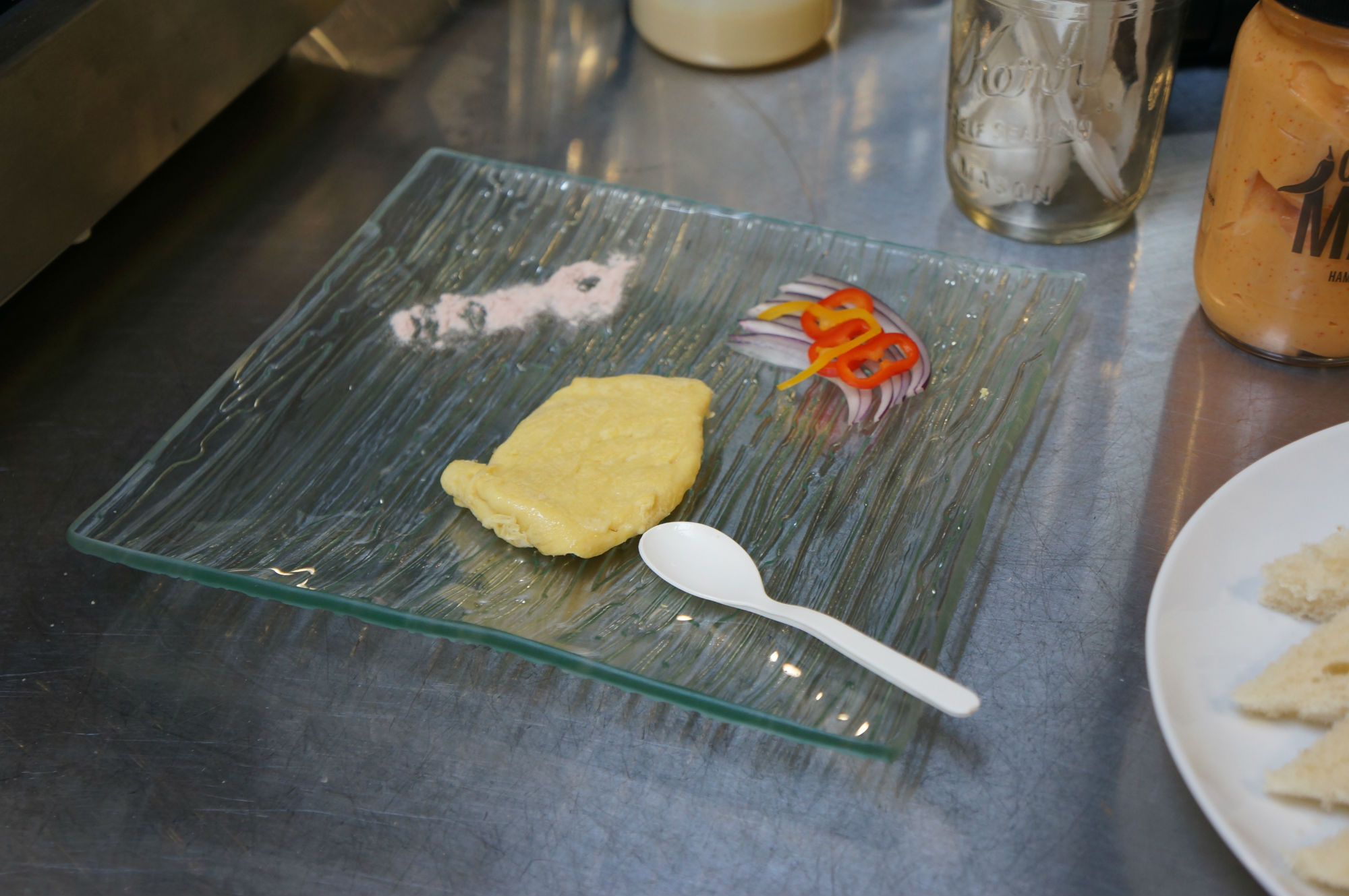Eggs require as much energy to produce as beef. Can we make them from plants?

The first thing to greet you when you enter Hampton Creek Foods' headquarters in San Francisco's SOMA neighborhood is Jake, the founder's Golden Retriever. When you pull yourself away from his persistent pleas for love, you'll look up and wonder if you've strolled into a coffee shop. Around a large table and along a high counter, a hive of hip, casually dressed 30-somethings have their heads buried in their laptops, typing furiously or reading with furrowed brows. But this venture-backed group of biochemists, marketers and chefs are not making another insufferablemobile app. They are developing a new kind of egg — one made with plants, not laid by chickens.
At the helm is Josh Tetrick, the dashing 34-year-old former collegiate footballer who founded Hampton Creek in 2011. You detect the trace of a drawl as Tetrick, raised in Alabama, rattles off well-worn pitch points for the merits of replacing the 1.2 trillion eggs laid by chickens each year with plant-based alternatives. And compelling pitches they are: Barely out of the gate, Hampton Creek attracted $500,000 in seed funding from Khosla Ventures. Bill Gates, Peter Thiel and most recently the powerful Chinese billionaire Li Ka-shing — who invested $23 million — are also backers.
Even if you aren't bothered by the fact that factory-farmed eggs are laid by hens that are de-beaked, cruelly jammed nine to a cage and force-fed soy and corn their whole lives, the conventional egg has an environmental backstory that is perhaps equally horrifying. The ratio of energy input to protein output for beef cattle is 40:1. You might guess that eggs would be much lower, but you'd be wrong. According to a report in the American Journal of Clinical Nutrition, the ratio for eggs is 39:1. That is more energy than is used to produce milk and raise swine combined.
Egg production is a resource hog largely because of the land and petroleum-based fertilizers and water needed to grow chicken feed. The whole premise of raising chickens for eggs does not make much sense from a basic business efficiency point of view, Tetrick says. In fact, 70 percent of the cost of egg production is from chicken feed, he notes, which is how Hampton Creek can compete on price.
"It takes 100 yards to grow enough soy or corn to feed chickens to produce a dozen eggs," Tetrick explains. "It takes 10 yards to grow enough crops for the equivalent amount of egg substitute."
Ah, but herein lies the rub: finding one plant from which to tease out the many characteristics — such as the ability to emulsify, gel or foam — found in the humble egg has proven impossible thus far.
The proteins of the Canada Yellow Pea #9 were an early score for the company; they are the basis for Just Mayo, a vegan mayonnaise and Hampton Creek's flagship product. But before the winning derivative of Canada Yellow Pea #9 was discovered to be a great egg alternative for making mayo, the company tried more than 1,400 different formulations that failed.
The grocer Whole Foods has carried Just Mayo since last year, but Hampton Creek scored a bigger coup this year: Safeway is rolling the product out nationwide. Even Costco is starting to sell Just Mayo (in XL containers, of course).

Over the long term, Hampton Creek has its sights on mainland China, where a whopping 38 percent of the global egg supply is produced (the United States accounts for only 8 percent). That's why the recent investment by Hong Kong magnate Li Ka-shing is an important strategic win for the company.
Before Hampton Creek cracks the global egg, however, there is plenty of work to do. A single crop species might have thousands of cultivars with slightly different characteristics. Finding the perfect combination for a given application is slow and methodical work.
That is why, behind the coffee shop-like facade of the Hampton Creek headquarters, where its real laboratory core reveals itself, I find senior food scientist Gosia Jakubasch checking on a tray of pretty green seedlings which she will later analyze, looking for clues that they might create a plant-based egg that might emulsify like a champ. Or may be great at coagulating. Who knows. "It's all in the genes," she says.
(Hampton Creek founder Josh Tetrick with Chinese billionaire investor Li Ka-Shing; Image credit: Wong Wing Ho; photo of imitation eggs courtesy of the company)
Sign up for our weekly newsletter featuring in-depth business innovation stories by correspondents around the globe, top domestic reporters and thought-provoking opinion columnists.
This post was originally published on Smartplanet.com